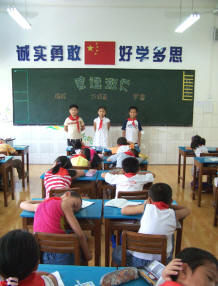INSIDE:
NEWS/STORIES/ARTICLES
Book Reviews
Columns/Opinion/Cartoon
Films
International
National
NW/Local
Recipes
Special A.C.E. Stories
Sports
Online Paper (PDF)
CLASSIFIED SECTION
Bids & Public Notices
NW Job Market
NW RESOURCE GUIDE
Archives
Consulates
Organizations
Scholarships
Special Sections
Upcoming
The Asian Reporter 19th Annual
Scholarship & Awards Banquet -
Thursday, April 20, 2017
Asian Reporter Info
Contact Us
Subscription Info. & Back
Issues
ASIA LINKS
Currency Exchange
Time Zones
More Asian Links
Copyright © 1990 - 2016
AR Home

Where EAST meets the Northwest
|
ON THE STUMP. Please Vote for Me follows eight-year-old students in an elementary school in China as they campaign for school monitor, in the first election for a class leader held in a school in China. The documentary film airs on Oregon Public Broadcasting October 28 at 11:00pm. (Photo/Jifeng Guo/ITVS) From The Asian Reporter, V17, #42 (October 16, 2007), pages 16 & 20. Please Vote for Me: A crash course in democracy Please Vote for Me Directed by Weijun Chen Produced by STEP International, 2007 Presented by ITVS for "Independent Lens" By Ronault L.S. Catalani You’ve heard it often enough, maybe you’ve said it yourself: America, the great social experiment. We’ve all discussed it, certainly with some consternation but also with a bit of pride. The United States is a deliberately engineered civilization, constructed on an enlightened century’s elegant aspirations. As big as America’s founding fathers dreamed, China’s doing it bigger. And it’s not just China’s enormous scale that so startles; the PRC’s party fathers are power-steering 1.3 billion people, all as determined as any eager American immigrant to dump a conflicted past in heady trade for a future full of promises. Please Vote for Me is about the bigness of all that. It’s about how steep, how suddenly steep China’s rush from communal ideals (Confucian or Chairman Mao’s all the same) to the pursuit of individualized gratification has got to be. What could be a better palette than a bunch of inquisitive third graders? "What is democracy?" the film’s director Weijun Chen asks of a wiggly eight-year-old. No reply. "What is a vote?" The next little girl squirms instead of answering. When recently asked by Why Democracy House, a progressive South African educational circle, what’s the point of asking little people such big questions, Mr. Chen was quoted as replying: "I think, in China or this world, some people may not care about democracy, may be not concerned about politics, but most people like kids. From the perspective of kids, we see human nature more truly." Evergreen Primary School Please Vote for Me takes place at Evergreen Primary School. In front of her bright class Teacher Zhang tries her best to fit those giant ideals inside kid-size concepts. She tells her students they are going to try something new. In the past — that is: for as long as any grand elder’s memory — authorities selected leaders. Now, Mrs. Zhang’s third-graders are going to elect a Class Monitor. It is a job of great authority. It is a job title and a list of duties quickly accommodating China’s tectonic social and political shifts. Heaven and earth are trading places. For 4,000 or so years, arrogant feudal then earnest communist officials told families what to do; in a few weeks third graders will decide what kind of leader will meet their learning needs, their individual tastes. The compelling charm of Please Vote for Me is in how familiar, indeed maybe even inevitable, the popular election process becomes. Bare-knuckled threats, outright lies, well-placed bribes, and well-resourced lobbyists, happen without a savvy politician’s play book. Every old trick of "representative" leadership is played out in grandiose rises and moral tumbles, in triumph and in tears. This is wonderful documentary. No voiced-over supportive stats or pithy political science. Just three third-grade politicos, some reluctant, some shameless, yet all participants in a social experiment of unprecedented scale and consequence. TV reporter turned indie documentarian Weijun Chen (Chen Weijun), director of Please Vote for Me, has a regular day job at a local TV station. His work for the Wuhan news broadcaster is mostly what political leadership and passive followership expect. His art, his courage, finds expression in the film he makes after hours, certainly using those technical skills he sharpened at Wuhan TV, probably using his station’s film equipment and office supply cabinet. Stealth is no doubt necessary, but, as Mr. Chen is quoted in an April 2003 Time interview, the risks are "the most important thing I’ve done in my life." Mr. Chen’s Peabody and Grierson Award-winning film To Live is Better Than to Die (2003) took form and life out of a related health news story assigned him. A doctor he met on assignment told Mr. Chen about his HIV/AIDS patients. The real story, the facts Mr. Chen wanted to tell, shifted sharply from his instructed task, and then focused unflinchingly on a poor rural family, four out of five of them dying miserably of HIV/AIDS. Local police found out about his unofficial reporting and detained Mr. Chen. Another reporter smuggled away his tiny digital tapes inside hotel soapboxes stashed in her purse. "The more trouble they gave me," the filmmaker told Time, "the more I knew I couldn’t let the project drop." The following February, To Live is Better Than to Die won a coveted big screen screening, got a standing ovation, and received an HBO offer at the U.S. Sundance Film Festival. Please Vote for Me is scheduled to air this month as a one of 10 selected documentary films of the BBC multimedia series "Why Democracy." Participating in the program are forty television, radio, and internet broadcasters representing 200 countries and territories, with a potential interactive audience of 300 million. Please Vote for Me airs locally on Oregon Public Broadcasting on October 28 at 11:00pm. For more information about PBS, Independent Lens, or Please Vote for Me, visit <www.pbs.org/independentlens/pleasevoteforme>. To learn more about Why Democracy, the BBC’s global series of events, go to <www.whydemocracy.net>.
|

